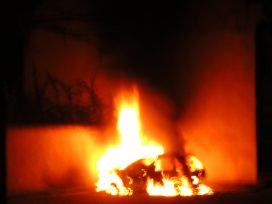Articles
Read more than 6000 articles in 35 languages from over 90 cultural journals and associates.
The formal laws constituting freedom of expression in democratic societies are only the tip of the iceberg of unwritten agreements between citizens about what they can express publicly in one context or another, says Göran Rosenberg. These agreements differ from society to society: in the case of Denmark, the agreement to allow expressions of anti-Muslim prejudice has served to produce conflict instead of dealing with it. With communications technology enabling the proliferation of parallel public spheres, the need for common agreements on freedom of expression are all the more necessary if conflicts such as the latest controversy over the Mohammed cartoons are not to intensify.
Marie Kathleen Jeffreys, an archivist who lived in early apartheid South Africa, wrote extensively about the social origins of the South African nation, specifically about slavery in the colonial Cape, as part of a project to resist the increasingly ossified racist legal and social structures of South Africa. In a series of articles for the political magazine Drum, she wrote about Krotoa-Eva, the first indigenous Khoikhoi woman to marry into colonial settler society. Jeffreys’ use of Krotoa-Eva as a “mother of the nation” figure can be compared to the resurgence of writing about her in post-apartheid South Africa. Discourses of “racial difference” and “racial mixing” in the formation of “the nation” need to be seen in an historical perspective that takes account of gender as an axis of experience with relation to “race”, and as a tool for discursive identity construction.
"Resting" by Attila Bartis
An introduction
Resting, the acclaimed third novel by Romanian-Hungarian author Attila Bartis, published in Hungarian in 2001 and in German in 2005, is simultaneously private psychodrama and portrait of the end of the Communist era. Reading it, “we arrive at ourselves, at our own obsessions, in our own silence”, writes Ilma Rakusa.
Roses, oranges... and coca
What remains of revolutions in the globalized world?
Why has no one called the victory of Bolivian president Evo Morales a “revolution”, despite it sharing some of the characteristics of the “coloured revolutions” in post-Soviet countries? Because unlike the politics of the coloured revolutionaries, which has been about complying with Western norms and values, the leftist nationalism of Morales challenges the established hierarchy of the global order, says Tatiana Zhurzhenko. Is Morales’s victory an anachronism, the last socialist revolution of the twentieth century, or a new type of response to social injustice from outside globalization’s charmed circle?
After almost half a century of socialist state policy replacing rights by privileges and making migration from village to city a powerful instrument of domination, countries like Bulgaria have found themselves in the complex geometry of the EU. Around two million persons a year of a population of seven million are in permanent motion, working abroad, studying, coming back, investing, leaving again. This trend towards overcoming arbitrary socio-political spaces is most evident in the Internet’s utopian horizon of absolute mobility. But is the downside to this utopia a loss of public spirit?
Forget marrying a rich American: for the Russian middle-class woman, a better life means aerobics and Benetton. Foreigners may bewail the power of international capital, but elegance and the money with which to purchase it were precisely what was not available under dull utilitarian communism.
Silences and parodies in the East-West feminist dialogue
Identity as problem
Eastern European feminist discourse is confronted with a dual exclusion: from the Western feminist discourse from which it borrows its terms, and from its own societies, where its foreignness is distrusted. Here, one eastern European feminist describes how her discourse becomes a parody of Western feminism, and how the alienation this produces is compounded by a perceived lack of societal normalcy. In this respect, parody becomes a subversive response to a reality felt to be absurd. But whose interests does this subversion serve?

The old "new clothes" of the French Republic
In defence of the "insignificant" rioters
It is possible that the “apolitical” youths of the banlieue have done more to set things in motion in France than thirty years of political posturing. Disregarding the lamentable reaction from the French Right, they have forced a reconsideration of the pitfalls of a universalist Republican ideology that refuses to recognize the existence of ethnic minorities. In doing so, they are the true defenders of society, says the director of the French journal Multitudes.

November nights 2005: The geography of violence
A round table discussion
Nicolas Sarkozy, with his reference to suburban French youth as “scum”, did more than anyone else to stoke the flames of the 2005 riots. Now, his presidential victory is likely to cause continuing resentment in France’s suburbs. In a discussion published at the time, French urban geographers, sociologists, and political scientists discuss the causes and effects of the rioting and offer solutions to the conditions responsible for it. While the unrest had precedents in the 1980s and 1990s, they argue, this time it involved new actors, new areas, and new targets. Unemployment, ghettoization, unsympathetic policing: the causes are familiar enough. Only this time, young people were unable to find any more political means of expression than violent implosion. What can policy offer? Social mixing looks good on paper but depends on people having control of the process; redistributive taxation can be equally self-defeating. Now that place struggle has replaced class struggle, can the riots be understood as a new attempt to force solidarity from the middle classes?
Literary perspectives: Hungary
Mastering history through narrative?
In the first essay in the Eurozine “Literary perspectives” series, publisher Gábor Csordás introduces five new Hungarian novels. All share a concern with history and narrative, and all but one – György Spiró’s narrrative tour de force set in the Roman empire at the time of Christ – deal with Hungary’s recent past: the post-war period as experienced by the Slovak minority; a child’s-eye view of social changes during the Communist upheaval; a contemporary Jewish-Hungarian son’s struggle with his father and the past that formed him; and a collision of myth and mundanity when the closure of a collective farm causes the past to unravel. Spiró’s novel too, it emerges, sheds light on contemporary issues: the historical setting echoes in the anti-Semitism concerning many in Hungary today.
Tim Wilkinson, the English translator of Imre Kertsz, talks about the lack of literary translations in the UK and US, and assesses past, present, and forthcoming efforts to bring Hungarian literary fiction to the English-speaking market.
The Belarusian opposition
Preparation for the presidential campaign of 2006
On 16 October 2005, the Belarusian democratic opposition, the Congress of the Democratic Forces, launched its 2006 election campaign with the “Day of Solidarity”. The protest action involved lighting candles in darkened rooms in order to demonstrate support for “disappeared” opposition members. But despite its good intentions, is this kind of protest the best way to go about gaining support from floating voters? The election manifesto also contains some ill-judged rhetoric, including unlikely promises and revolutionary fervour. An outside observer offers constructive criticism of the Belarusian opposition.
The "Siedlung" and the "Mahalle"
The intertwined history of the modern residential neighbourhood in Europe and Turkey
The intertwined history of the modern residential neighbourhood in Turkey and Germany serves to point out the shortcomings of a polarized discussion of Turkey and Europe, and more broadly, shows how histories restricted to single nation-states do not help understand processes that occur at a trans-national level. Esra Akcan describes how the egalitarian architecture of prewar Germany was interpreted for the Turkish Republic, where it became a status symbol for a new class of bureaucrats. Migration and cultural exchange in directions opposite to those commonly known are shown to undermine reified concepts of “East” and “West”.
Neighbourhoods
Introduction
Must we respect religiosity?
On questions of faith and the pride of the secular society
It is said that Western societies are entering an age of post-secularity, in which there is a need for a truth beyond that offered by conventional science. Fine, say liberals, simply take your pick from the many faiths on offer. But from religion’s standpoint, the idea that “You can believe what you want” seems indifferent and mistaken. Respect between the religious and the non-religious is necessary if this tension is not to become intolerance.